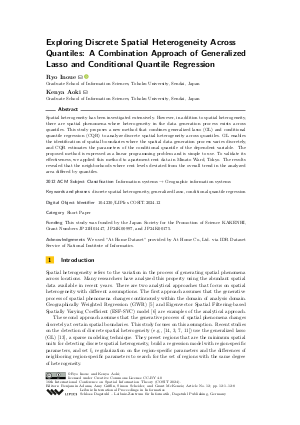Exploring Discrete Spatial Heterogeneity Across Quantiles: A Combination Approach of Generalized Lasso and Conditional Quantile Regression (Short Paper)
Authors
Ryo Inoue  ,
Kenya Aoki
,
Kenya Aoki
-
Part of:
Volume:
16th International Conference on Spatial Information Theory (COSIT 2024)
Part of: Series: Leibniz International Proceedings in Informatics (LIPIcs)
Part of: Conference: Conference on Spatial Information Theory (COSIT) - License:
 Creative Commons Attribution 4.0 International license
Creative Commons Attribution 4.0 International license
- Publication Date: 2024-09-09
File

PDF
LIPIcs.COSIT.2024.12.pdf
- Filesize: 3.82 MB
- 8 pages
Document Identifiers
Subject Classification
ACM Subject Classification
- Information systems → Geographic information systems
Keywords
- discrete spatial heterogeneity
- generalized lasso
- conditional quantile regression
Metrics
- Access Statistics
-
Total Accesses (updated on a weekly basis)
0PDF Downloads0Metadata Views
Abstract
Spatial heterogeneity has been investigated extensively. However, in addition to spatial heterogeneity, there are spatial phenomena where heterogeneity in the data generation process exists across quantiles. This study proposes a new method that combines generalized lasso (GL) and conditional quantile regression (CQR) to analyze discrete spatial heterogeneity across quantiles. GL enables the identification of spatial boundaries where the spatial data generation process varies discretely, and CQR estimates the parameters of the conditional quantile of the dependent variable. The proposed method is expressed as a linear programming problem and is simple to use. To validate its effectiveness, we applied this method to apartment rent data in Minato Ward, Tokyo. The results revealed that the neighborhoods where rent levels deviated from the overall trend in the analyzed area differed by quantiles.
Cite As Get BibTex
Ryo Inoue and Kenya Aoki. Exploring Discrete Spatial Heterogeneity Across Quantiles: A Combination Approach of Generalized Lasso and Conditional Quantile Regression (Short Paper). In 16th International Conference on Spatial Information Theory (COSIT 2024). Leibniz International Proceedings in Informatics (LIPIcs), Volume 315, pp. 12:1-12:8, Schloss Dagstuhl – Leibniz-Zentrum für Informatik (2024)
https://doi.org/10.4230/LIPIcs.COSIT.2024.12
BibTex
@InProceedings{inoue_et_al:LIPIcs.COSIT.2024.12,
author = {Inoue, Ryo and Aoki, Kenya},
title = {{Exploring Discrete Spatial Heterogeneity Across Quantiles: A Combination Approach of Generalized Lasso and Conditional Quantile Regression}},
booktitle = {16th International Conference on Spatial Information Theory (COSIT 2024)},
pages = {12:1--12:8},
series = {Leibniz International Proceedings in Informatics (LIPIcs)},
ISBN = {978-3-95977-330-0},
ISSN = {1868-8969},
year = {2024},
volume = {315},
editor = {Adams, Benjamin and Griffin, Amy L. and Scheider, Simon and McKenzie, Grant},
publisher = {Schloss Dagstuhl -- Leibniz-Zentrum f{\"u}r Informatik},
address = {Dagstuhl, Germany},
URL = {https://drops.dagstuhl.de/entities/document/10.4230/LIPIcs.COSIT.2024.12},
URN = {urn:nbn:de:0030-drops-208272},
doi = {10.4230/LIPIcs.COSIT.2024.12},
annote = {Keywords: discrete spatial heterogeneity, generalized lasso, conditional quantile regression}
}
Author Details
Funding
This study was funded by the Japan Society for the Promotion of Science KAKENHI, Grant Numbers JP21H01447, JP24K00997, and JP24K00175.
Acknowledgements
We used "At Home Dataset" provided by At Home Co.,Ltd. via IDR Dataset Service of National Institute of Informatics.
References
- Rinaldo. A. Properties and refinements of the fused lasso. The Annals of Statistics, 37(5B):2922-2952, 2009. URL: https://doi.org/10.1214/08-AOS665.
- V. Y.-J. Chen, W.-S. Deng, T.-C. Yang, and S. A. Matthews. Geographically weighted quantile regression (GWQR): An application to U.S. mortality data. Geographical Analysis, 44(2):134-150, 2012. URL: https://doi.org/10.1111/j.1538-4632.2012.00841.x.
- H. Choi, E. Song, S. Hwang, and W. Lee. A modified generalized lasso algorithm to detect local spatial clusters for count data. AStA Advances in Statistical Analysis, 102:537-563, 2018. URL: https://doi.org/10.1007/s10182-018-0318-7.
- J. Fan and R. Li. Variable selection via nonconcave penalized likelihood and its oracle properties. Journal of the American Statistical Association, 96(456):1348-1360, 2001. URL: https://doi.org/10.1198/016214501753382273.
- A. S. Fotheringham, M. E. Charlton, and C. Brunsdon. Geographically weighted regression: A natural evolution of the expansion method for spatial data analysis. Environment and Planning A: Economy and space, 30(11):1905-1927, 1998. URL: https://doi.org/10.1068/a301905.
- D. A. Griffith. Spatial-filtering-based contributions to a critique of geographiaclly weighted regression (GWR). Environment and Planning A: Economy and space, 40:2751-2769, 2008. URL: https://doi.org/10.1068/a38218.
- R. Inoue, R. Ishiyama, and A. Sugiura. Identifying local differences with fused-MCP: An apartment rental market case study on geographical segmentation detection. Japanese Journal of Statistics and Data Science, 3:183-214, 2020. URL: https://doi.org/10.1007/s42081-019-00070-y.
- R. Koenker and K. F. Hallock. Quantile regression. Journal of Economics Persoectives, 15(4):143-156, 2001. URL: https://doi.org/10.1257/jep.15.4.143.
- E. R. Lee, H. Noh, and B. U. Park. Model selection via Bayesian information criterion for quantile regression models. Journal of the American Statistical Association, 109(505):216-229, 2014. URL: https://doi.org/10.1080/01621459.2013.836975.
- At Home Co. Ltd. At home dataset. Informatics Research Data Repository, National Insititute of Informatics.(dataset), 2023. URL: https://doi.org/10.32130/idr.13.1.
- R. Masuda and R. Inoue. Point event cluster detection via the Bayesian generalized fused lasso. ISPRS International Journal of Geo-Information, 11(3):187, 2022. URL: https://doi.org/10.3390/ijgi11030187.
- Y. Sun, H. J. Wang, and M. Fuentes. Fused adaptive lasso for spatial and temporal quantile function estimation. Technometrics, 58(1):127-137, 2016. URL: https://doi.org/10.1080/00401706.2015.1017115.
- R. Tibshirani and J. Taylor. The solution path of the generalized lasso. The Annals of Statistics, 39(3):1335-1371, 2011. URL: https://doi.org/10.1214/11-AOS878.
- H. Wang and A. Rodríguez. Identifying pediatric cancer clusters in florida using loglinear models and generalized lasso penalties. Statistics and Public Policy, 1(1):86-96, 2014. URL: https://doi.org/10.1080/2330443X.2014.960120.
